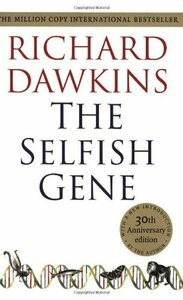Take a photo of a barcode or cover
Good book, but if you already have a background in biology you aren't going to get much out of it.
If you haven't explored evolution in-depth, this is a great great book (it may also be a great book if you have, but I'm not on top of the literature enough to know that). Partly that is because the operation at the genetic level is not what you will remember from high school biology, and is really interesting. And partly because the author does a really good job of exploring the impact evolution has on many many behaviors, both human and animal.
One weakness, at least for me, is that the author is certainly pushing a particular view (it's all about the genetic level; anyone who thinks it might operate at some other level is a moron), and those who aren't experts won't know the field well enough to know if he is presenting all the best counter-points to his particular take on things.
But overall that is a quibble; it is a great book.
One weakness, at least for me, is that the author is certainly pushing a particular view (it's all about the genetic level; anyone who thinks it might operate at some other level is a moron), and those who aren't experts won't know the field well enough to know if he is presenting all the best counter-points to his particular take on things.
But overall that is a quibble; it is a great book.
Mi è piaciuto un sacco, adoro la scienza e scoprire i meccanismi della natura e del mondo è bellissimo. L'unico problema che ho trovato è stato sul capitolo dei memi, non era il libro giusto per parlare di religione.
Good starting point to understanding evolution. It's all about the genes! The only reason we are here is because our parents successfully reproduced, our parents' parents sucessfully reproduced, our parents'....
Pretty terse for non Biologists, but makes a great case for the gene as the "unit" of natural selection. Gives lots of great examples of evolution by natural selection in nature.
Another book I read so you don't have to! This was the most Victorian "science" book I have read, shocking since it was published three-quarters of a century after the Victorian age ended. Pompous, arrogant, breathtakingly condescending and mostly wrong. Don't bother with Dawkins, Sagan is much better and his works stand the test of time.
The reason why this book is a seminal work is because the explanations, ideas, and hypotheses Dawkins sets out in it are largely accurate 40+ years on.
However, it was very difficult to read at points (this, coming from a scientist) and became a chore to finish.
However, it was very difficult to read at points (this, coming from a scientist) and became a chore to finish.
challenging
informative
inspiring
reflective
medium-paced
The last non-fiction book I'd read was Guns, Germs, and Steel by Jared Diamond which tells the story of human civilization from when we first evolved on Africa to the modern day.
I followed that up with The Selfish Gene, which starts with guesses about the so-called primordial soup of hundreds of millions of years ago and ends its story with every living thing we have today. Clearly, I read these books in the wrong order.
Of course, it also provides some perspective: I had originally thought that Guns, Germs, and Steel was a brief summary; but Dawkins covers vastly more ground than Diamond did in fewer pages. So, naturally, The Selfish Gene is not a detailed history. Instead, it's a popular-science level in-depth* description of the basic principles of natural selection.
I certainly had a lot of it wrong**. So I'm grateful that Dawkins starts at the very beginning and slowly builds up his theory step by step and example by example. With something of a math background, I particularly appreciated the sections on game theory and evolutionarily-stable-strategies.
Every chapter has a similar ebb and flow. They start out with basic principles and contrived examples and slowly build up to more complicated cases and real-world scientific examples. This is a good: you know what to expect in each chapter. And if a chapter starts bogging down as Dawkins gets more complex, you know that you'll get a break when the next one starts. It's nice.
I checked Wikipedia before writing this review: the absence of a "Criticisms" section for this book leads me to believe that the contents of this book is still the orthodox and accepted theory of how natural selection works. Assuming that's true, this is probably one of those rare books that everyone needs to read. Even though I know far less about this stuff than even a Freshman biology student, I know far more about the origins of all the species around me (including my own!) than I did before I started reading this book. While I don't expect to be able to apply any selfish gene principles at the office tomorrow, I suspect that being able to place so much into this larger context will be beneficial to my understanding of the world: I'll probably be benefiting from this book for the rest of my life.
The executive summary:
If Diamond answered the question "Who are we?", Dawkins masterfully explains "Why are we here?". The answer ("Because our ancestors' genes survived.") may not be particularly satisfying on a spiritual or philosophical level for some. But the fact (as Dawkins goes to great pains to point out) that we appear to be uniquely capable of asking and answering that question in the first place gives us a power that's essentially brand new on the earth: We can change our world for the better. We can work together to rise above the petty demands of our selfish genes.
Heavy stuff.
*At least, as in-depth as it's probably possible for a pop-sci book to be.
**This is not even a little surprising if you consider my education where the answer to just about any question was "A wizard God did it".
I followed that up with The Selfish Gene, which starts with guesses about the so-called primordial soup of hundreds of millions of years ago and ends its story with every living thing we have today. Clearly, I read these books in the wrong order.
Of course, it also provides some perspective: I had originally thought that Guns, Germs, and Steel was a brief summary; but Dawkins covers vastly more ground than Diamond did in fewer pages. So, naturally, The Selfish Gene is not a detailed history. Instead, it's a popular-science level in-depth* description of the basic principles of natural selection.
I certainly had a lot of it wrong**. So I'm grateful that Dawkins starts at the very beginning and slowly builds up his theory step by step and example by example. With something of a math background, I particularly appreciated the sections on game theory and evolutionarily-stable-strategies.
Every chapter has a similar ebb and flow. They start out with basic principles and contrived examples and slowly build up to more complicated cases and real-world scientific examples. This is a good: you know what to expect in each chapter. And if a chapter starts bogging down as Dawkins gets more complex, you know that you'll get a break when the next one starts. It's nice.
I checked Wikipedia before writing this review: the absence of a "Criticisms" section for this book leads me to believe that the contents of this book is still the orthodox and accepted theory of how natural selection works. Assuming that's true, this is probably one of those rare books that everyone needs to read. Even though I know far less about this stuff than even a Freshman biology student, I know far more about the origins of all the species around me (including my own!) than I did before I started reading this book. While I don't expect to be able to apply any selfish gene principles at the office tomorrow, I suspect that being able to place so much into this larger context will be beneficial to my understanding of the world: I'll probably be benefiting from this book for the rest of my life.
The executive summary:
If Diamond answered the question "Who are we?", Dawkins masterfully explains "Why are we here?". The answer ("Because our ancestors' genes survived.") may not be particularly satisfying on a spiritual or philosophical level for some. But the fact (as Dawkins goes to great pains to point out) that we appear to be uniquely capable of asking and answering that question in the first place gives us a power that's essentially brand new on the earth: We can change our world for the better. We can work together to rise above the petty demands of our selfish genes.
Heavy stuff.
*At least, as in-depth as it's probably possible for a pop-sci book to be.
**This is not even a little surprising if you consider my education where the answer to just about any question was "
challenging
informative
medium-paced




